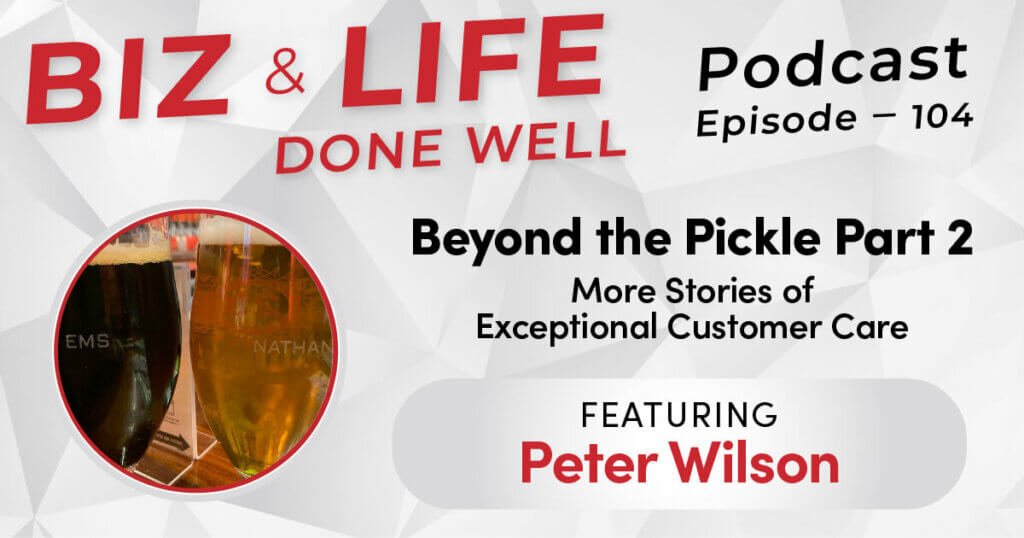Title: Beyond the Pickle Part 2 – More Stories of Exceptional Customer CareGuest: Emily Caddell
Peter: Today, I’m with Emily Caddell, the director of marketing for bizmarketing.com. Hey, Emily.
Emily: Hey, Pete. Thanks for having me on.
Peter: Today, we are going beyond the pickle part two. We are gonna be talking about how businesses that we have interacted with or have observed have gone beyond the pickle in terms of treating their customers with the things that they were looking for. And if you’ll recall, the genesis of this whole pickle story was Bob Farrell, who had Farrell’s restaurant. A customer asked for an extra pickle. That was his tradition when he went to Farrell’s restaurant.
He would get a burger, milkshake, and it always asked for an extra pickle, and he always got one until one time he went in and a wait person said, well, sir, we’ll have to charge you for that extra pickle. And that incensed this customer to a point where they wrote a letter to Bob Farrell and said, Bob, I will never come to your restaurant again if I have to pay for an extra pickle. I’ve always gotten a pickle extra without paying. What’s going on here? And that was a rallying cry for Bob Farrell.
He decided, Hey, I need to train my staff a little better on this sort of thing. And so he used the pickle situation as a rallying cry. So his motto from then on was give them the pickle, meaning if a customer wants something like that that they expect, give it to them. And then last week or last time we talked about going beyond the pickle part one, we talked about Turn and Tender steak restaurant in South Africa. Paul Lee told us about that where he had gone to the restaurant.
And after going to the restaurant once or twice, the staff made a point of getting everybody’s name. And the third time he went back to the restaurant, he sat down to have a steak dinner. The wait staff pulled away the knife that was sitting at the table and presented Paul with a engraved a knife engraved with his name for him to use while he was at the restaurant. Pretty amazing story. Pretty amazing setup.
I have a picture of the knife actually, and I don’t think Paul would go anywhere else to get a steak dinner. Emily and I were talking about this story, and Emily related a story. Is it a brew pub, restaurant?
Emily: Brew pub. Years ago when we moved to Boston, we’re creatures of habit. We like to find a brewery or something that we like to go to. And then once we find one we like, it sticks. And we tried Lord Hobo, and we’re like, okay.
This is a pretty cool place. We’ll come back a few times. And probably the third time after coming there, my husband went to pay, and he was like, hey. It’s under Caddell. And the guy who works there was like, I’m gonna stop you right there, Nathan.
We know your name. It’s okay. We know who you are. And we were like, what? Okay.
And so it was like, alright. These are our people. This is our place. It’s our personal cheers. Everyone here knows our name.
And it was just really fun. We felt automatically brought in to this place. And over the past five years, we’ve developed friendships. Really enjoy the people there. They’ve really gone above and beyond to just make us feel important.
You know, they’ve hung up pictures that hadn’t our son had drawn in their restaurant. Just make us feel really special. And what I was relaying to Pete a couple weeks ago was that they did this mug club thing. And it was over the year of 2023. If you had tried, it was like a 100 different beers that you needed to try.
And all of the competition type of things. And they had been giving us mug size pours to start with because we were regulars there. And we were like, well, that’s kind of a bummer. They’ll I don’t wanna do that. As as a regular, I know what I like to drink.
I’m not gonna go try all these different beers, but whatever. So we won’t get a mug. Just let it go. And then they came around and they were like, yeah. We’re not gonna make you guys do all that.
We’re just gonna get you a personalized mug because we know how much we appreciate you guys. And so couple weeks later, they brought out these fancy mugs. They have our names embossed on them. And so when we go, you know, they we walk in, they know what beer we like, they pour us in our fancy embossed mug, then it’s just a really good feeling. And it’s you know, like you said about Paulie, why would we go anywhere else when we know we’re gonna be taken care of when we go to Lord Hobo?
Peter: Yeah. And they the it’s interesting that your name signifies something.
Emily: Yeah.
Peter: Like, you say cheers where everybody knows your name.
Emily: Exactly.
Peter: Right? That’s we know that feeling. We like that feeling, and it’s such a simple concept, really.
Emily: Oh, yeah. It’s so easy to it just made us feel so immediately, oh, wow. This place really has an interest in us, and they care. It’s not just, oh, here’s another customer. It really is like someone going above and beyond to know your name is really a big deal.
Peter: So you’re not gonna go anywhere else, obviously.
Emily: Oh, yeah.
Peter: You’re not seeking another hangout. This really is your place. Have you interacted with others that have been treated the same way and related to similar stories?
Emily: Oh, yeah. As Nick, who’s the guy who we’re really close to there, puts it. He’s there’s regulars, and then there’s people who come here often. Often. And if we refer to you as a regular, it’s that we’re gonna take extra care of you.
If you’re someone who comes here often, sure, we’ll still, like, know your name, but maybe you don’t get the above and beyond
Peter: Right.
Emily: We necessarily get. They definitely have a few regulars there. But I think it also goes two ways of, you know, we have also intentionally tried to I wanna know your name that you’re like, not just this random person who’s serving me. It’s I wanna also, you know, communicate with you back and forth kind of thing. And that’s yeah.
So it’s kind of a special, you know, they really care about the people who are regulars there.
Peter: Right. So it’s a relationship beyond a one way, thanks for the business. It goes way beyond that. Definitely. So the story I have is sort of related, but not it’s a little different.
It’s definitely go beyond the pickle. And it was a long time ago in a past life, I worked in the marine electronics industry in Europe, and I was a European sales manager for an American electronic manufacturer. We had a distributor in Scotland, Woodson’s of Aberdeen. Kenneth Wood was the guy that I worked with mostly. Very staid, very proper.
I would describe Kenneth as sort of a a gray James Bond, little beyond the younger years. Ran the business very well, took care of the accounts, took care of the customers. They had a huge staff of electronic technicians that worked on all the boats in the fishing fleet in, Scotland on the, East Coast Of Scotland. So it’d be on the Aberdeen side of Scotland, up in Fraserburgh and Peterhead and, in in that Aberdeen area. I really enjoyed working with Kenneth, just a gem of a guy.
And one time we were at a fishing show in Aberdeen. They didn’t really do many of these fishing shows, but it was a show where all the suppliers would show all their equipment. It was an opportunity for the fishermen to come in and buy the equipment. Now when I say fishermen, I’m not talking about some guy in a little skip. These boats are multimillion dollar boats fishing out in the North Sea.
They are doing seining these big purse seiners, and then they’re also doing dragging of some sort. So these are multimillion dollar boats, and the guys that own them, they’re pretty well off. They you don’t just end up owning a multimillion dollar boat just by winging it. And so we were at this show, and one of the captains slash owners came up, and he had a bag. It was the show, and he had this plastic bag, and he was carrying it around, and he was getting stuff for the kids for his kids because at these shows, people give away tchotchkes, you know, pens and keychains and flashlights and stuff like that.
The suppliers would. So he came up, and Kenneth obviously recognized this guy. There’s not a whole lot of people that are in this fleet. There’s probably less than a 100 of these people, and every one of them is a very important customer for Woodson’s of Aberdeen. And the guy came up and he opens his bag and he says, hey.
Have you got any pens for the kids? And I was looking at Kenneth, and I knew they didn’t have any pens to give away that year. And I observed Kenneth reach into his pocket, pull out a gold cross pen right out of his jacket, dropped it in the bag, and kept talking to the guy. And you could just see. I was like, wow.
That was crazy. He dropped probably a $50 pen in this guy’s bag and kept talking. They had their conversation. And Kenneth probably in the course of that conversation made a $30,000 sale to this owner of all this equipment, but he didn’t even hesitate. The thing was he didn’t even Kenneth did not even hesitate.
He didn’t look around. He just reached in his pocket. He knew exactly what he was going to do, dropped the pen, and kept talking. I was blown away, and I talked to him about it later. I said, Kenneth, that was like a $50 pen you just dropped in that guy’s bag.
He goes, Yeah, that was nothing. Got more of those, and that sale we just made was more than makes up for the pen. Now I don’t think it was necessarily a transactional thing that Kenneth was thinking about. He was thinking about not stopping the conversation. So it was like he knew this guy wanted something.
It was really important for this guy to take some pens back to the kids. The guy was on a mission. As soon as that got satisfied, Kenneth could continue the conversation about whatever work they were doing for these guys. So that always stuck with me, that that moment. Hopefully, I’ve conveyed a little bit of the essence of that moment in conveying this story.
I would just wanna honor Kenneth and his example. It’s like, wow. Going back to the pickle, if the wait person had just grabbed a pickle and said, here’s your pickle, sir, would have been the same thing.
Emily: Oh, yeah. Yeah. That’s a great story.
Peter: We are looking for more beyond the pickle stories. I’m sure you know a story or two that kind of fits this mold. It’s really about listening to the customer and responding to their needs and desires and taking out the friction in doing that. Emily and Nathan didn’t have to drink a 100 different beers. Right.
And Kenneth didn’t have to turn away his customer and say, Sorry, we don’t have any pins this year. That would have been a miss. The steak restaurant, they could have just kept giving you the same old steak knife and not knowing your name. Who knows the long term impact of that on the business? Probably huge.
I mean, here we are in The US telling a story about a steak restaurant in South Africa.
Emily: Oh, yeah.
Peter: Encourage you all to tell us your stories. Send us an email to pod@bizmktg.com. We’d like to get you on the air if you would, feel comfortable doing that to tell your story. Go and be on the pickle. Can’t wait to hear your stories.
Till next time. Thank you, Emily. Thank you very much.
Peter: Thanks for listening to this episode of Biz and Life Done Well with Peter Wilson. You can subscribe to us on iTunes, Google Podcasts, Spotify, and most of the other popular podcast platforms. Please tell your friends about us and leave us a review so even more people will find out about us. Thanks again. We’ll see you soon.



